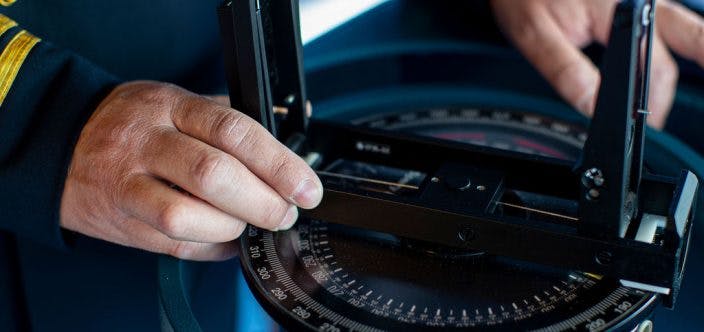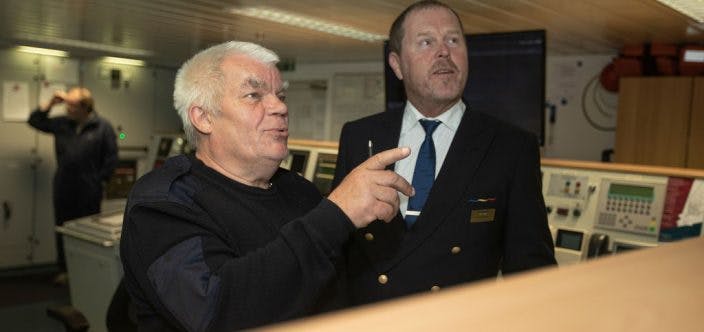Communication about mental health
Effective communication is important, but it is likewise important that we dare to discuss sensitive subjects. One subject we should communicate more about is seafarers' mental health.

Communication is vital when working at sea. In addition to ensuring that communication is effective, it is important that we dare to discuss sensitive subjects that are seldom talked about, but that affect onboard safety and performance to a high degree. One central subject we should communicate more about is seafarers´ mental health. Onboard many vessels and within society at large, this subject is still stigmatized and consequently often under-discussed and overlooked.
The mental health wheel
The different areas that contribute to mental health can be visualized as a mental health wheel.
The mental health wheel is divided into six different areas. When all of these areas are sufficiently supported, your mental health is good and secure. You are your own best potential. The more areas are insufficiently supported, the harder it is for the wheel to turn smoothly, which means that your mental health will be affected. This, in turn, may manifest in different ways, such as lower motivation and compromised performance.
How well the wheel functions can vary from one day to the next, but as a whole the more often it can run without missing parts, the better it will perform. There may, of course, be other factors that affect mental health, but the wheel gives an overview of the situation.
Factors that support mental health areas and factors that weaken them:
Factors that support mental health areas |
Effects in insufficiently supported areas |
Healthy stimulation |
Stress |
| Sustainable working environment | Stressful working environment |
| Manageable changes | Fast changes |
| Time to complete jobs according to the plan | Not enough time to do jobs properly |
| Do one thing at the time | Multitasking |
| Wise leadership | Bad leadership |
| Positive workplace culture | Bad relationships between co-workers |
| Home situation that is customized for your work situation | Home situation that cannot be managed on distance |
Positive thought patterns |
Negative thought patterns |
| Logical objective thoughts/ helicopter perspective | Rumination |
| Positive thoughts about yourself | Negative thoughts about yourself |
| Positive thoughts about others and environment | Negative thoughts about others and environment |
| Complete honesty to oneself | Avoiding unwanted thoughts |
| Trust that everything will work out for the best | Loss of imagined control |
| Fact-based world view | Irrational worldview based on biases |
Physical health |
Physical ill health |
| Healthy food | Unhealthy food |
| Exercise that fits your needs | Not enough exercise |
Emotional well-being: I often feel… |
Emotional displeasure: I often feel.. |
| calm and confident | scared or afraid |
| in control of my own life | helpless |
| appreciated | unappreciated |
| fulfilled in life | empty |
| that I can reach my goal | frustrated |
| forgiving | angry |
| joy | sad |
| enough sociable | lonely |
| comprehension why something happened | irritated |
Social well-being |
Social isolation |
| Manageable contact with home | Not enough contact with family |
| At least one person onboard to talk other things than work with | Nobody to talk other things than work with onboard |
| Relationship where you feel deep trust (1-3 is recommended) | No close friend |
Well rested |
Fatigue |
| Enough time to sleep | Not enough time to sleep |
| Enough qualitative sleep | Not enough qualitative sleep |
An example how a person’s mental health wheel can look like:
This person’s mental health wheel can roll quite smoothly, but the areas weakened by insufficient support may lead to an imbalance which, if not stabilized with the help of strengthening practices, can affect the person’s overall well-being, motivation and performance.
Poor mental health is something that EVERYONE experiences at some point. It is not consistent and can vary from one day to the next. Mental health is like a muscle that needs regular training to be healthy. Some people have naturally good mental health, but everyone can benefit from training the “mental health muscle”.
Shipping can be a stressful working environment for many reasons. According to the latest research, seafarers’ well-being and mental health is in an extremely precarious state, which is why it is crucial to bring up this subject and actively discuss it. It is equally important to be honest to yourself regarding how you really feel and take action to prevent poor mental health.
Some numbers to discuss in crew meetings:
Some of the key findings in the Seafarer Mental Health Study conducted by ITF Seafarers’ Trust and Yale University (2019)
- 25 % of the seafarers in the study had scores suggesting depression
- 17 % of the seafarers in the study had scores suggesting anxiety
- 20 % of the seafarers in the study had suicidal ideation
You can read about the study here on ITF Seafarers’ Trust web page
A good role model
A good role model is someone who can share how they actually feel with others in order to help reduce the stigma related to mental health issues. The strongest person is not the one who seems like a stone and never shows any feelings; instead, it is the person who actively fights every day for better mental health for his/herself and others. Since persons who suffer from poor mental health often show very low motivation, their speaking up and taking action to increase mental health requires a true seafarer’s willpower.
In the NOT ON MY WATCH CAMPAIGN by Sailors’ Society: A brave Captain, Dan Thompson, speaks openly about his depression.
What can I do to improve mental health?
1. Sailors’ Society has a well-known and established program to train mental health: Wellness at Sea. 
Here are some materials from the program for your benefit:
- If you suspect that you have depression, you can take a test from Sailors’ Society’s Wellness at Sea program, Depression: Should You Get Help?
- To learn to recognise depression in yourself and in others, look at Sailors’ Society’s Depression: Know The Signs
- Read some Top Tips To Keep Mentally Fit from Sailors’ Society
2. To be well-rested is essential to prevent mental health
See Fatigue Self Help Manual from the MARTHA Project Team (Claire Pekcan)
3. Alandia’s Mental Health Training at Seably
Alandia’s Mental Health Training contains seven different lessons. First, an introductory course to introduce the subject of mental health and how we would be able to destigmatize it. This is followed by a mental health section divided into five different elements: Social relations, Emotional well-being, Physical health, Food and nutrition, and Rest and sleep. The last lesson summarises the course and talks about important support structures.
After the training course, you will have several tools to strengthen your mental health. Remember also that this is not a quick fix. To experience improvements from the course you would have to use the tools continuously.





